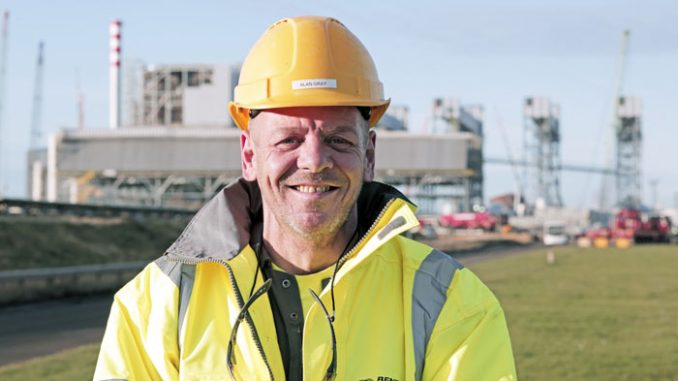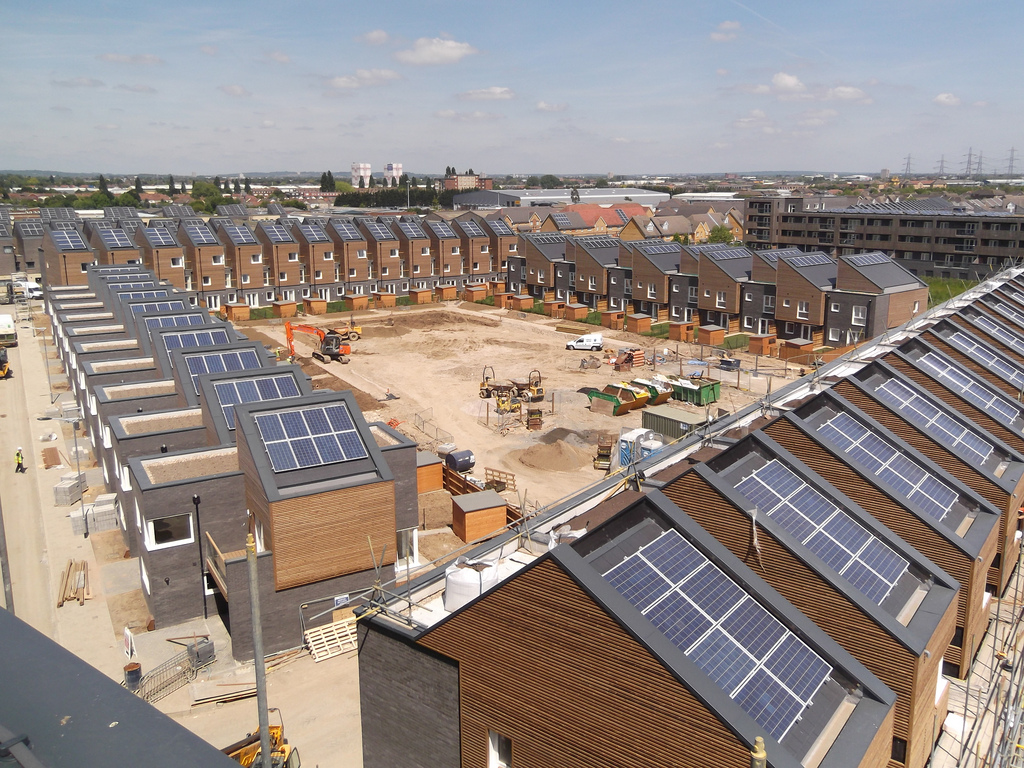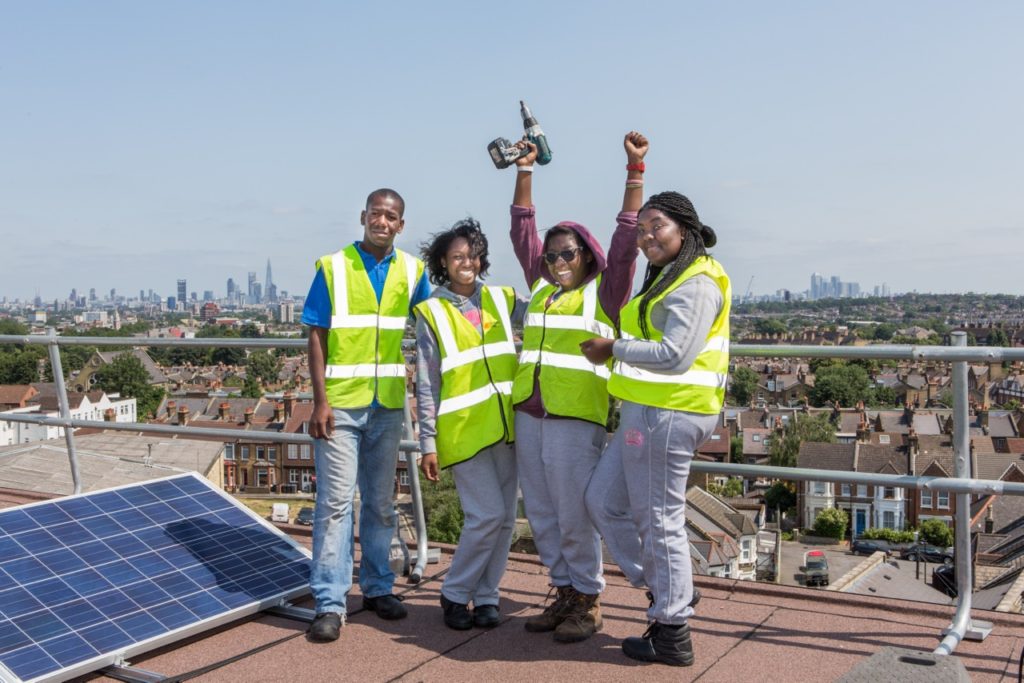Redcar & Cleveland Borough Council – Grangetown Training and Employment Hub
The award winning Grangetown Training and Employment Hub is a partnership between Redcar & Cleveland Borough Council, the Future Regeneration of Grangetown (FROG) and MGT Teeside, which owns and operates the new Teeside biomass power station. To-date, more than 850 people have successfully found work through the hub, including many at the biomass power station site.
Alan’s story: Unemployed for over six months, 52 year-old Alan Gray felt his future looked bleak. But thanks to the advice and support he received from the Hub, including skills training and CV writing, Alan has a new job with Bentall Rowlands assisting the building of the silos at the under-construction MGT Power Plant. “I had loads of support with my CV and training and if it wasn’t for them, I wouldn’t have this job.”

RetrofitWorks

Ashden Award winner Parity Projects set up the RetrofitWorks cooperative to boost the able-to-pay market for energy efficient retrofit by providing access to this market for small local installers who are ‘practitioner members’ of the co-operative. RetrofitWorks ran three out of six pilot schemes funded by BEIS to test approaches for increasing the rates of energy efficiency improvements by providing support for local supply chain integration. These pilot schemes were Cosy Homes Oxfordshire, Ecofurb (London), and Warmer Sussex, which across the three years completed a total of nine retrofit projects and signed up 195 installation supply chain organisations. Cosy Homes and Ecofurb are still running, allowing residents to visualize the retrofit opportunity for their homes and reduce energy costs through their free plan builders. Retrofitworks also launched a training programme to all members on whole-house retrofit to help upskill contractors and increase the capacity of retrofit projects.
Zedify

Zedify operate a fleet of e-cargo bikes from hubs in Cambridge, Brighton, Norwich, Glasgow, Edinburgh, Southampton, Waltham Forest and Central London, making over 600,000 deliveries a year. The parcel delivery market is growing rapidly at around 7% per year but is well known for poor employment conditions. In contrast, Zedify’s 100+ riders are all paid the living wage and provided with 3-6 months of training. As more towns and cities adopt restrictions on deliveries during peak hours to reduce congestion and pollution, Zedify offers a valuable zero-emission service to businesses while providing good employment opportunities. Furthermore, by securing £300,000 from private investors in 2020, Zedify is looking to expand its capacity with new hires and up to 20 new depots by 2022.
Liverpool City Region – £2bn Low Carbon Economy
In February 2019, Liverpool’s Metro Mayor Steve Rotheram announced plans for a new £10 million Green Investment Fund, which will back renewable energy projects and support his ambition for a zero-carbon city region by 2040.
Liverpool City Region has assessed potential employment and enterprise growth in the low carbon sector. The Low Carbon economy in the City Region experienced a net increase in employment of 7.75% (2,645 jobs) over the period 2010 to 2016, employing over 22,000 people in 1,400 companies. The sector contributes over £2bn to the City Region’s economy.
The decision by Government to designate the City Region as a Centre for Offshore Renewable Engineering (CORE Status) is recognition of Liverpool’s continued potential in the low carbon and renewable sector. Growth is being stimulated through £3.5bn of investment in Liverpool Bay, the exploitation of commercial opportunities in low carbon environmental goods and services, development of energy and heat networks and the imperative for a modal shift in transport. Gross Value Added (GVA) of the sector is expected to rise by 34% by 2030.
Q-Bot – creating attractive, highly skilled jobs in energy efficiency retrofit

Millions of homes in the UK have ‘suspended floors’ – a ground floor built from wood with a ventilated gap underneath – and up to 25% of their heat loss can be through the floor. Q-Bot has developed a robot that can apply a layer of insulation beneath suspended floors. There’s no need to pull up carpets or create disruption because Q-Bot’s robots can gain access through the exterior wall or a small hole in the floor and use on-board sensors to create dynamic 3D maps to guide installation and identify hazards. Q-bot has recently been deployed to help local authorities decarbonise, with, for example, both Islington Council and Bristol City Council using Q-Bot in their net-zero by 2030 plans.
Q-Bot’s work is creating attractive, highly skilled jobs, increasing productivity, reducing waste, and improving safety and accountability. These jobs appeal to school-leavers and graduates, whether in the design and maintenance of robots or in the installation process.
Nottingham Workplace Parking Levy
To tackle traffic congestion, Nottingham City Council introduced a Workplace Parking Levy (WPL) in 2011. The WPL places a modest charge on employers providing 11 or more parking places, and invests the revenue in sustainable transport measures such as new tram infrastructure and routes, electric buses, cycling and public transport real time bus display equipment.

Since the introduction of the levy, journey time per vehicle mile increased more slowly in Nottingham than in comparable cities, despite strong jobs growth. According to an evaluation undertaken by Loughborough University, there is positive evidence from case studies of major inward investments due to the public transport improvement components of the WPL package which is making Nottingham more attractive for employers.
Community wind farms in Scotland – benefiting the local economy

A Scottish study found that the involvement of local contractors in on-site works for new community energy schemes can bring in around £10k (based on a 900kW turbine) to the local economy. Income from operation and maintenance of the project (typically land rental and local management charges) are estimated at £20k per annum. Operational income can range from £100k – £250k per annum (the latter being in exceptional island locations). Local investors will typically be offered a 2% premium over other locally available investment opportunities. Where local investors take up 25% of a £1million share offer – representing a combined investment of £250k – an additional £5k per annum will accrue to local investors within the community, a portion of which will be spent on local goods and services.
Energy Local – matching local energy demand with local supply

Energy Local CIC has introduced a game-changing solution to large discrepancies in the amount households pay and the amount generators earn from distributed renewable energy generated at a local level with its match tariff. Most community energy schemes feed directly into the grid without any capacity for local people to use this energy at preferential rates. Members of an Energy Local Club, the first of which is in Bethesda, Wales, can use local hydro-generated electricity at a price that is mutually beneficial.
Small-scale renewable energy is sold to energy suppliers at 7-8p per kWh, but people living nearby buy electricity back at up to three times that price. However, Energy Local uses new smart meter technology to allow households to match their use to local renewables. This is having a direct impact on fuel poverty, generating additional funds for renewable generators and keeping energy spend in the local economy.
As part of the Smart Energy Savings competition, a BEIS funded research project, Energy Local has partnered with Octopus Energy to encourage more community-run green energy generators that provide energy to the local neighbourhoods at a reduced cost. There are currently 20 Energy Local Clubs providing this service. Energy Local Bridport went live in late 2021 with 14 households, but hopes to expand to its full capacity of 55 households. One of the latest Local Energy Clubs, in partnership with Repowering London, Bioregional and Octopus, focuses on the community-run solar energy generator on the rooftops of the Roupell Park Estate in Brixton which will supply local low-income residents with low-cost renewable energy.
Abundance – testing municipal community bonds

Crowd-funding platform Abundance won an Ashden Award in 2014. Abundance and the University of Leeds have just completed a Department for Digital, Culture, Media & Sport funded project, Financing Society, helping three UK local authorities and three NHS bodies to conduct feasibility studies on using investment-based crowdfunding to finance specific infrastructure projects in their area. One of these case studies is Leeds City Council which has an ambitious plan to decarbonise the city’s infrastructure and is looking to commercialise an estimated annual £277m of profitable low carbon projects. Leeds wants to ensure that the economic benefits of these projects are captured locally and that residents of Leeds participate in the low carbon transition.
The council’s finance team has undertaken a technical and commercial assessment of a community municipal bond to finance a roof top solar project across the council’s estate, the council are currently assessing a 2019 pilot. The other two local authority case studies are Bristol, which is considering a community municipal bond to finance energy efficiency retrofit work in the council estate, and Isle of Wight, which has looked at investor-based crowdfunding to supplement other funding for regeneration projects.
Repowering – training young people in renewable energy

Ashden award winner Repowering delivers community-based renewable energy. They have delivered projects in some of the most deprived councils in London including Lambeth and Hackney. These projects get local people involved, providing opportunities to gain skills and confidence. Repowering provides a paid youth training programme to do this, with, so far, 123 interns paid to learn new skills. The accredited programme is targeted at upskilling 16-25 year olds and gives an insight into sustainable energy, social enterprise and community development. Training includes activities such as solar panel making, visits to renewable energy technology sites, discussions with industry specialists and more general skills such as digital marketing, brand building, community engagement and surveying. By involving communities, rather than imposing projects on them, they’ve successfully implemented projects in areas previously deemed hard to reach.
The Royal Borough of Kensington and Chelsea Council has partnered with Repowering to create the North Kensington Community Energy Project. It has installed 86 kWp of solar panels across 3 community locations, with more solar panels planned to be installed in the future. As well as making the borough greener, this Repowering project is selling back the solar-generated power to the community buildings at a discounted price and reducing energy costs. A large part of the income generated will also fund community projects, such as paid internships that educate and provide job training for 16-19 year olds in the local area.
West of England Combined Authority – An inclusive strategy to tackle climate change and improve air quality
In 2019, The West of England Combined Authority produced an inclusive industrial strategy that included a clear aim to both tackle climate change and improve air quality. Key points of focus in the strategy include:
- Building inclusive growth, helping residents to gain access to skills training and become work-ready, including for roles in the low carbon economy.
- Supporting productivity and business growth by setting a West of England Productivity Challenge to encourage all businesses to improve performance and sustainability. Introducing green business measures, such as long-term sustainability and improved energy efficiency, in addition to creating a clean growth ecosystem and skills network.
- Innovation in infrastructure delivery – building innovation in infrastructure without increasing carbon emissions. This includes supporting innovation to produce more sustainable products.
The Local Industrial Strategy’s Low Carbon Challenge fund, to develop the West of England Growth Hub, is already in progress with two live grant streams: the green business grants which will help small and medium-sized enterprises, and the local energy scheme which will support one to two small-scale, innovative projects focusing on renewable energy generation. The fund plans to support 130 businesses by 2024/25. The strategy’s ambition for a network of Living Labs is also progressing. The Future Transport Living lab, aimed to be delivered in 2024, will work with local communities and stakeholders to find solutions to overcome mobility challenges as well as promote sustainable transport options. It will particularly focus on those in disadvantaged areas who are less able to travel, and thus less likely to access employment and education opportunities.
In 2022, the Authority published a green skills report which highlights the range of different jobs and skills levels required to enable the West of England to reach net zero by 2030.
West Midlands – the UK’s first clean and inclusive Local Industrial Strategy
The West Midlands Combined Authority produced the UK’s first Local Industrial Strategy, launched by the West Midlands Mayor and Government Ministers in May 2019. The strategy has a clear clean and inclusive growth strand at its heart by:
- Incorporating carbon emissions reduction, air quality and natural environment as part of the current and future growth objectives.
- Setting out key local strengths and sectors which will make the best of this opportunity – e.g. future mobility.
- Identifying how to integrate into other local sector support – e.g. innovation, housing.
- Supporting infrastructure investment will help the foundation of all local business and clean growth e.g. energy, transport, natural capital.
The West Midlands Combined Authority, as part of their climate emergency action plan, is in the process of launching a £45,000 Green Futures Fund. It aims to identify and evaluate how schools can develop career programmes that allow students to connect their learning to green jobs and have the information they need to access them in the future.
Councils in Norfolk and Suffolk fund a new training centre on offshore wind
In the past decade, the UK has emerged as a world leader in offshore wind energy. And some of the biggest winners from the multi-billion pound investment look set to be coastal towns searching for their industries of the future.

One such town is Great Yarmouth, which is ranked 20th amongst local authority districts with the highest proportion of their neighbourhoods in the most deprived 10% of neighbourhoods nationally. The town’s port was used as the construction base for ScottishPower’s £2.5bn East Anglia One wind farm, creating 3,500 jobs during construction and 100 long-term skilled jobs in operation and maintenance . It has also secured an operations and maintenance deal for Swedish energy firm Vattenfall’s two wind farms, which will be the biggest in the world. These contracts will create up to 150 jobs for 25 years, creating hundreds more in the supply chain.
To help ensure local people can benefit from these opportunities, the East of England Offshore Wind Skills Centre opened in the town in December 2018, based at East Cost College Great Yarmouth Campus. It’s a collaborative regional training and competence facility that will support local people wishing to reskill and gain sustainable employment in the offshore wind industry on the New Anglia Energy Coast. The Centre has been made possible by a £1.1 million grant from the New Anglia Skills Deal Programme, provided by Norfolk County Council, Suffolk local authorities and the Education and Skills Funding Agency. Currently, the centre offers a 12 week course on safe working practice in the wind turbine industry and a three-four week course on the transition to offshore, helping students find jobs in the sustainability sector.
Cambridgeshire County Council – helping schools to slash energy bills and generate revenue
Cambridgeshire County Council has used the Ashden-award winning Re:fit Programme to deliver guaranteed energy efficiency savings in schools across the county. The council provides loans or managed service arrangements to pay for the energy saving measures and can draw down public sector capital from its Local Energy Investment Fund to pay for the works up front. The aim is to help schools plan for the future and manage their energy bills, as well as operate more efficiently and reduce their carbon emissions. For example, Great Paxton Primary School was spending £11,000 on energy each year.
A range of energy efficiency and renewable solutions were installed through this programme, halving the school’s energy bill and generating over £4,500 in income each year. This represents a total saving on annual energy costs of almost 90%. Since 2014, they have worked with over 55 schools to improve their energy efficiencies, resulting in a collective saving over £600,000. Under the Re:fit Framework Agreement, current retrofit projects are being delivered with the help of Bouygues Energies and Services. Also in progress, with funding from the Government’s Public Sector Decarbonisation Scheme, are two projects working to install ground source heat pumps in Comberton Village College and The Galfrid Primary School to replace the existing oil and natural gas heating systems and reduce the schools’ energy bills.
The transition from oil to ground source heat pumps for Comberton College, expected to be installed in early 2022, is estimated to save them approximately £40,000 per year.
Previous Section:
4.4 Links to statutory duties
Next Chapter:
Chapter 5 – Resilience and adaptation

